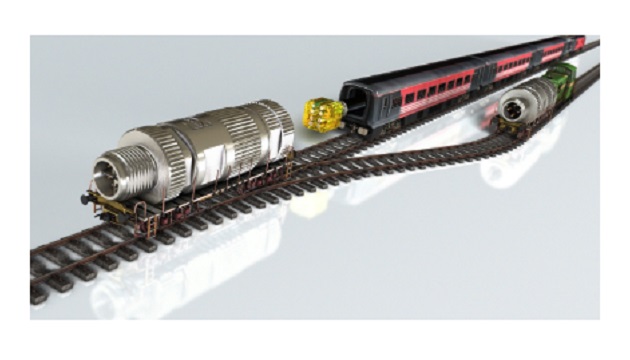Train travelers now expect high-performance Internet access: They want to surf privately during the train journey or use the compartment as a mobile workstation. The railway operators must therefore offer an appropriate data infrastructure to meet the increasing customer requirements. This requires new cabling systems. HARTING has developed solutions to ensure reliable and fast Internet in trains.
Data networks in trains and buses can be implemented reliably and in future-proof manner using the preLink system and EtherRail cables, which are specially designed for railway requirements. With Ethernet via only one pair of wires, rail operators can reduce their operating costs and optimize their production with the tool-less PushPull system.
The central component of the preLink system is the termination block, which allows the cable connection to be performed quickly, simply and reliably. The small size of the preLink contact block makes it possible to prefabricate data cables separately from the train car and then install them in the former. A minimum hole diameter of just 12 mm is sufficient to insert and route the cables.
Once the cables have been laid, the appropriate connector is attached, depending on the network device to be connected. Here, both RJ45 and M12 D- and X-coded connectors (socket or pin) are available for data transmission of up to 10 Gbit/s. This unique diversity of mating faces, in conjunction with standardised preLink connection technology, offers unparalleled flexibility and investment security, especially over long periods of use within railway technology scenarios. The system simultaneously simplifies assembly, making it both faster and more reliable.
A current innovation is the M12 sockets, which can now be connected via preLink as well. The newly designed sockets can be used both as a loose cable coupling as well as a housing feedthrough and be securely screwed here. The second innovation is a preLink printed circuit board socket that allows the user to connect pre-assembled preLink cables directly to the printed circuit board without the need for detours.
As a result, there is no need for a permanent detachable connection to a housing via connectors, and Ethernet connections can be quickly and cheaply brought directly to the circuit board. The combination of the modular preLink system and Etherrail cable is the ideal matchup for cabling rolling stock. With easy-to-install connectors and cables, trains can be equipped with future-ready Gigabit Ethernet and make an important contribution towards providing the infrastructure for the mobile workplace of the future.
Ethernet through Single Twisted Pair (SPE)
The goal of Ethernet via Single Twisted Pair cable and small connectors according to IEC 63171-3 is to achieve weight savings while offering identical performance. Under IEEE 802.3bp (1000 BASE-T1), cable lengths up to 40 meters can transmit 1 Gbit/s — while the cable length is about one-third less than conventional 8-wire Ethernet cable.
A standard Ethernet cable with four wire pairs for 1/10 Gbit/s Ethernet weighs about 45 kg per kilometer. In contrast, a Single Pair cable with the same bandwidth weighs only 30 kg per kilometer. Since several kilometers of cable are installed in the cars of passenger trains alone, this offers a considerable savings potential in terms of vehicle weight.
Tool-less installation with PushPull
HARTING offers its PushPull solutions in order to simplify assembly and service in the railway sector while improving reliability. The solutions consist of the circular M12 PushPull connector in a rugged metal housing, as well as the lightweight, easy-to-use rectangular variant 4 connector. Securely transmitting power, data and signals up to Category 6A presents no difficulties with M12 and with variant 4.
The HARTING Technology Group has focused on the rail sector for years, and the company’s extensive portfolio of products and solutions has been presented to numerous customers in Espelkamp during the “HARTING Railway Days”.
For more information, visit: www.HARTING.in








